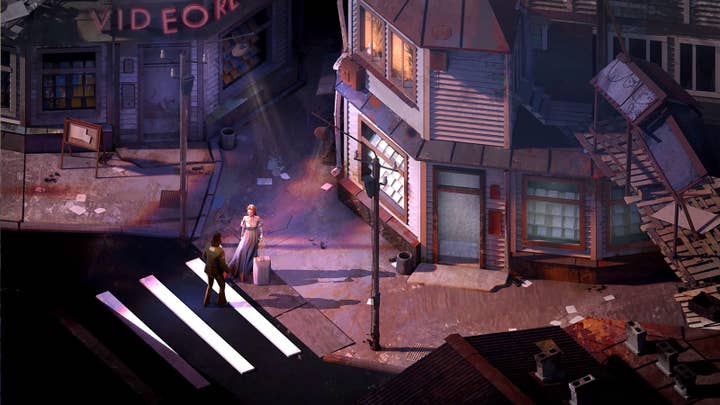The manifold challenges of localising Disco Elysium
Testronic's Manuel Jimenez Verdinelli details the hurdles of localising ZA/UM's hit and its one million words
How do you translate a non-linear RPG that has been lauded by many as one of the best written games ever released, with over 100 hours of gameplay, over a million words, a wealth of Soviet-era cultural cues, and one of the most passionate fanbases online?
That was exactly the question posed to our teams in early 2020 when Disco Elysium developer ZA/UM approached us to help with the localisation of 2019's breakout hit that invites you to explore a complex social reality from the point of view of an amnesiac detective and the myriad voices inside his head.
The project featured over a million words. In terms of sheer text volume, it was unlike anything we've worked on before
For the uninitiated, the game itself stands apart from most RPGs out there, having been written and designed by Karelian-Estonian author Robert Kurvitz, taking its visual inspiration from watercolour painting and a narrative style that relies heavily on complex dialogue, skills and a 'thought cabinet', rather than combat.
Early in 2020, discussions began between ZA/UM and Testronic regarding the localisation of Disco Elysium. The project featured over a million words, and was very heavily focused on text, with a layered, heavily stylized and idiosyncratic approach to writing and world building. The approach itself merges a para-historical setting, with magical realism, and themes of social inequality, politics, drug and alcohol abuse, depression, the role of police -- and more.
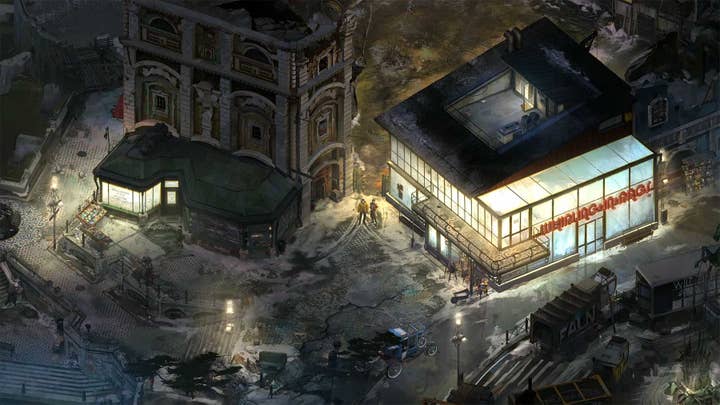
Anyone who has played the game will know that it is designed to endure multiple playthroughs with distinct approaches to character building, and unique features such as skills or attributes -- manifesting as distinct voices in the protagonist's head. This influences dialogue flows, and progression through the collection and investment in thoughts via a system known as the 'thought cabinet'.
On top of all that, the Disco Elysium fanbase was extremely passionate, and followed every announcement or bit of news that surfaced regarding their new favourite game. They were protective of this universe and could be vocal if something appeared to threaten its authenticity. This was undeniably the most complex project our team has handled to date.
The project presented the following key challenges, which were mostly identified at a project preparation stage that lasted for around two months.
- Quality expectations: Working on a title of high complexity with great acclaim. As the project had already gathered a dedicated fan base with attachment to the game, it was clear that the translations we produced would have to live up to their expectations -- and go beyond that.
- Text complexity: As mentioned, the game's prose and themes are layered and varied, and translating the style and meaning required a very strong command of literary language and a firm grasp of the game's interest in sociological, political and metaphysical elements.
- Logistics: Planning such a large project amidst the times of an unforeseen pandemic, with set release dates required careful team management in order to make sure the plan at large, including LQA (localization quality assurance), would remain feasible.
As Jeremy Pavy, lead French editor says, Disco Elysium was an incredibly unique project with its own set of challenges and obstacles. In terms of sheer text volume, it was unlike anything we've worked on before. At first, it's just a number -- one million words... we'll be fine! Then you get started and realize the size of the task at hand.
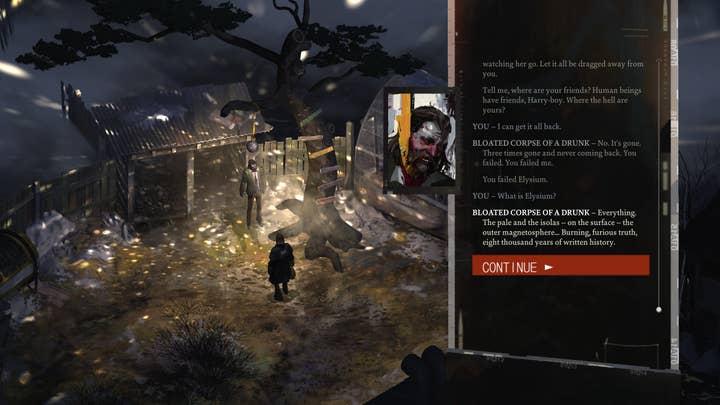
Aside from project challenges, there were additional hurdles that were atypical for translation engagements. For starters, the fans of Disco Elysium were making themselves known. The game's community had been really engaged in communication with the developers and active on online chat boards. This was particularly intensified by the fact that this was ZA/UM's first game and that the studio came across as less corporate and more approachable than other, more established developers. The fact that the game draws from a variety of influences and fields, and requires advanced literacy to be enjoyed fully, also meant that its players are rightfully demanding in their expectations.
As such, out of the box creative thinking also needed to be applied by ZA/UM to the task of translating Disco Elysium into multiple languages -- a process the studio referred to as 'The Great Internationale'. The thinking was simple: invite the game's high-engaged fan community to help with the process of a) deciding which languages to localise for, and b) the actual localisation work itself.
It worked brilliantly, but in a few instances, extra resource and tools were required at the kind of scale only the games industry's seasoned localisation specialists can provide.
The game draws from a variety of influences and fields, and requires advanced literacy to be enjoyed fully
To help clarify the game's structure, ZA/UM gave us access to their content management tool, so we'd be able to see the dialogues as flow diagrams, and check when or why a given string would appear. Each account for the server was shared by an entire language team. And for us, that account soon became coveted like a shared bathroom, with people begging each other whenever they needed context!
When most games are translated in this way, the source material is usually split across many different files, with logically-related phrases scattered across those documents. Thankfully, with Disco Elysium this wasn't the case. But, while dialogues weren't broken, they also weren't linear (which is understandable given the non-linear nature of the gameplay itself), so even if dialogues are contained within the location where they take place in game, they are often shuffled in the raw text files.
This was our first challenge, but ZA/UM provided us with some files that contained helpful contextual issues, along with lengthy and detailed reference documentation to bring forth more clarity about the game's lore and setting.
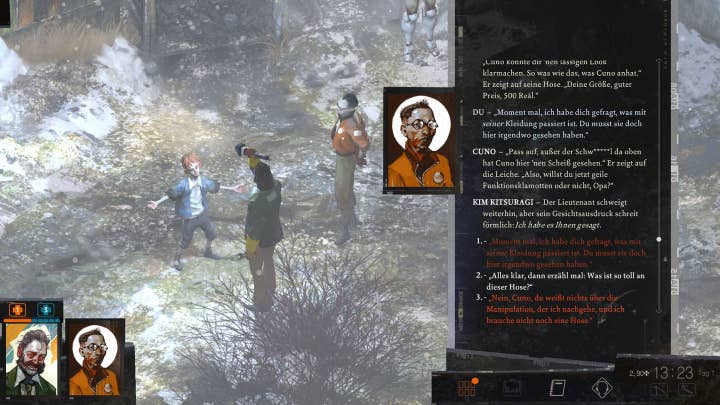
The game is packed with hundreds of cross-references and multiple inter-connected story strands. This made it necessary to back over previously translated text on a regular basis, as we became aware of connections previously missed. We would often discover in, say batch 9 or 10, that a nickname or amusing line translated in batch 1 or 2 had to be changed in a dozen instances -- along with the surrounding dialogue -- in order to fit the overall context. Thankfully, our editors always had access to the entirety of the text and were free to make as many belated changes as needed -- an absolute necessity for a project of this complexity.
Once a file was translated, it was then submitted back to the system for editing, which sparked some interesting debates as the project's editor and translation team brainstormed ideas and passed them back to the team at ZA/UM.
Meanwhile, the project editor's decisions weren't the end of the translation process -- due to the way the dialogue works within Disco Elysium we often needed to revisit certain lines to ensure that they matched similar phrases used in different circumstances within the narrative, across all languages.
We often needed to revisit certain lines to ensure that they matched similar phrases used in different circumstances within the narrative, across all languages
The non-linear structure was especially challenging. You would get the whole dialogue between the protagonist and one given character/set of characters, and it would include references to other conversations and characters we hadn't encountered yet. Harmonizing of all this was possible through hard work and collaboration with the QA team, who was able to recontextualise the trickier parts of the text.
Usually, in order to keep the original flavour from the source material, you don't change names, unless they are very hard to pronounce for your audience. However, you might have a different approach when facing a word or entire strings of your own language in the source material. In this case, the original intention might be to create a sense of strangeness or to tie a character to a certain cultural background.
We have a character that swears a lot in French in the original English version, which would be lost in translation if you use French words in a French text, so the team decided to use a variation of French that would sound like old French or possibly a French dialect. So 'camionneur' (lorry driver) and 'Après la vie, la mort' (after life, death) in the English version are respectively 'charotier' and 'Aprez la vithe, la morte' in the French translation, as explained by Esteban Holguin (French translator on this project).
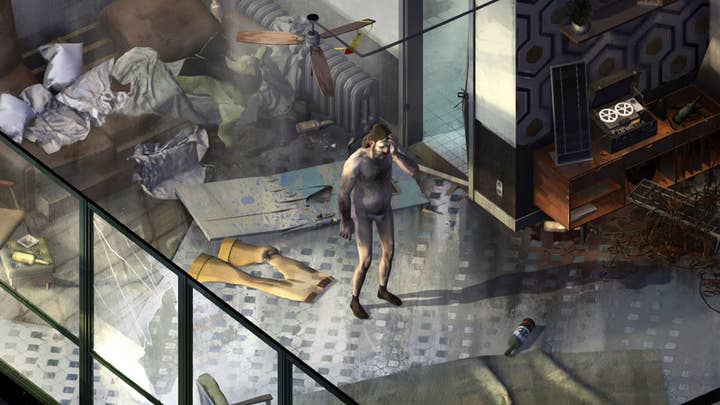
This was particularly the case with an element of the game called the Pale -- essentially a vacuous, insubstantial space between realities, which is left up to the player to interpret and decipher. We liaised closely with the developers on that one and they provided our team with some reference terms that were very useful for the Russian version.
But like everything with Disco Elysium, the solution to the 'Pale conundrum' was more nuanced than hitting upon a 'close match'. The studio's translation for Pale is "Серость". The term was initially coined in Estonian for the Disco Elysium novel by the studio's founder -- the Pale is called "Hall" or "gray" in the original text. Moreover, the word Cерость in Russian doesn't just describe a colour: the developers confirmed to us that the descriptions such as "mediocrity", "ordinariness", "inexpressiveness" are very appropriate for the concept.
Disco Elysium aims to recreate the experience of playing an old-school pen-and paper RPG, and with our German version, we aimed to support that feel as much as possible through our punctuation and spelling choices, under the direction of lead German editor Julia Steiner.
Understanding and conveying every little nuance [is] a respectable challenge, even if you do fancy yourself a seasoned linguist
For example, you will find that there are not many hyphenated words at all (three cheers for long compounds!), and we always opted for the most conservative spelling still permissible after the spelling reform of 2004/2006. Vocabulary-wise, we also had to suspend some of our modern sensibilities. We decided not to hold back on the swearing either, so be ready for a lot of "verf***te Scheiße"! By contrast, we aimed to make the narrative as lyrical and poetic as possible, so that the player can catch a breather from all the coarseness and take in the beauty of the world from time to time.
Besides the challenge carried by the insane volume involved, the huge variety of styles (from Elizabethan English to street slang), the vast vocabulary, the complex concepts discussed and, sometimes, the Estonian influence on the English, make understanding and conveying every little nuance a respectable challenge, even if you do fancy yourself a seasoned linguist.
Since Disco Elysium is written and presented very much like a novel, it poses some problems that game translators don't often encounter, and required consulting a range of printed books, from travel guides to fighting fantasy books from the 1970s. The game is full of highly specialized vocabulary that took hours and hours to research and balance, from entomology to economics to historical weaponry to magnetic tape recorders.
The hardest part by far the autopsy, reading up on the various stages of decay and their wonderful effects -- all complete with colourful illustrations -- made Julia's stomach churn so violently she could only eat very soft things for a few days. On the more positive side we have the Scooter lyrics -- lots of Scooter lyrics!
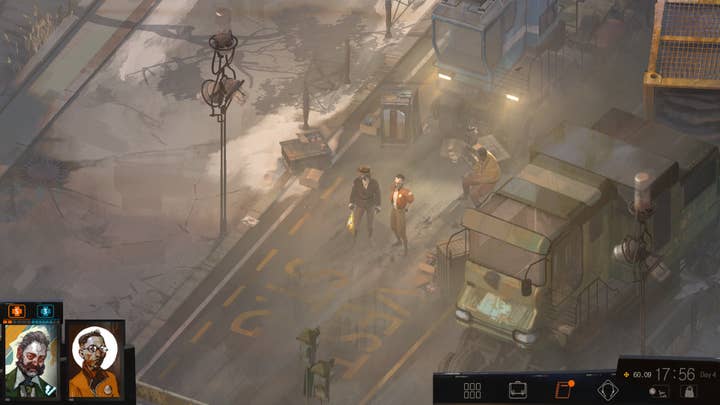
Closer to the end of the project, we took another look through all the files to check against possible inconsistencies, before handing everything over to LQA. This is a special department whose task it is check against oversights:
- Do all lines fit in the given length?
- Has an element of interface disappeared due to translation?
- Are there any contextual errors?
- Are answers being given to the wrong lines?
- Are characters randomly renamed in dialogue?
While all of the above would represent a significant undertaking with a regular game, not least one as nuanced as Disco Elysium, our localisation projects tend to be handled by a small core team (albeit one expanded in this instance by the impressive community feedback).
Put simply, the fewer people working on a volume of text at this magnitude the easier it is to a) maintain stylistic consistency, and b) ensure all contributors can be kept informed of key decisions, discussions and approaches.
The fewer people working on a volume of text at this magnitude the easier it is to maintain stylistic consistency
For example, unlike English, French has multiple levels of address, from very formal to very polite (tu/vous for pronouns). Usually, those can vary in real life -- you will start addressing someone you don't know formally, then the relationship would naturally progress into something less formal. But at what point do you include that transition in a non-linear game? We chose to stick to one option and adhere to it all the way through -- this was the best way to ensure consistency.
And with Disco Elysium it wasn't enough simply to be able to translate from English to French, German, Russian, and so on -- each team member was required to spend many hours playing and completing the game to ensure they were completely equipped for the task at hand.
Getting to know the characters, trying to put ourselves in their shoes to better translate their feelings, understanding all the moving parts at play in Harry's mind to reflect his despair, was as intricate as it was enriching. The game's lore is very dense, and it involved a lot of research to render the text not only as accurately, but also as beautifully as possible. It's not all about translating things simply as they are in the source, it's also about finding the perfect word that will bring rhythmic balance to a long sentence, adding an extra alliteration or breaking down a lengthy segment for dramatic effect. You learn as you translate, and that's one of the best takeaways from an experience like this.
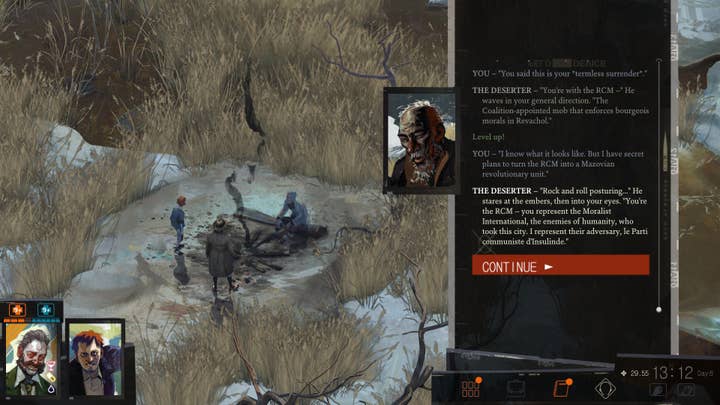
Finally, the Russian localisation required a specific approach -- originally planned as a community-led translation, it was eventually rolled into Testronic's project. But we discussed with ZA/UM the possibility of incorporating resources and part of the work performed by the community group. We decided to engage with the lead translator of the community group, 'Alphyna', who is an influencer in the Russian gaming community, and had an impressive profile. Incorporating her into our team allowed us to utilize some of the ideas and decisions that the community group had established, while also allowing us to improve the Russian player's perception of the project.
This, in itself, meant there would be some significant alterations to our regular processes and workflows, but meant that the task of translating Disco Elysium became quite unique and extremely rewarding. For example, everyone working on the project -- whether internally at Testronic or within the fan community -- used a single platform on a common server that synchronized everyone's work. This is especially useful for each translator to see how others have dealt with specific terms or frequently-repeated phrases.
As well as incorporating Alphyna into our team, we created frequent Steam blog posts to address the Russian community in particular. The aim of these posts was to demonstrate to the community that our team comprised Disco Elysium players who are as passionate as them -- and that our professional approach to translation would be used to enhance the experience.
The posts were structured to initially introduce our process, and followed up with more specific insight into the process of translating different aspects of the game, such as the 'attributes' or voices in the protagonist's head, or the jargon related to police forces. This also allowed for feedback to be collected and translations to be adapted to the players' preferences, within reason. This was a key move in terms of community management as the players now feel they matter. You can find the posts translated into English on this page, and we highly encourage reading through them for deeper insight into the process of our team, led by Russian editors Anna Mironova and Alphyna.
Too often video game localisation is viewed as a process-driven element of video game production -- an almost mechanical requirement of the QA process that needs to be ground through to its conclusion. But projects like Disco Elysium highlight the creative challenges faced by translators and the equally creative solutions they are able to come up with -- and those are only made possible through close working relationships with a game's creators and, as we increasingly believe should be the case, a game's community of fans.
Manuel Jimenez Verdinelli is head of translation at Testronic. He joined the company in 2015 as part of the localisation quality assurance team.
